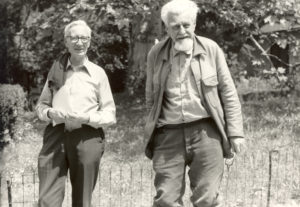Calling Nikolaas Tinbergen an animal behaviorist is a little like calling the Grand Canyon a little hole in the ground. Tinbergen, along with his colleague Konrad Lorenz, established the modern field of animal ethology, now an essential element of ecology and conservation.
Niko Tinbergen was born in The Hague, Netherlands, on April 15, 1907 (died 1988). The son of two school teachers, he would have been expected to be an academically talented student himself. But that wasn’t the case. “I was not much interest in school,” he wrote in his Nobel Prize biography. “…Wise teachers allowed me plenty of freedom to engage in my hobbies of camping, bird watching, skating and games….”
Nature was Tinbergen’s muse. He spent his free time observing birds, insects and fish. He tended aquariums in his backyard and school room, noting the next building and guarding behavior of sticklebacks. He watched Herring Gulls along the shore, and carefully observed the comings and goings of solitary wasps on the beach. He took careful notes and drew illustrations of what he saw.
His immersion in nature and the behavior of animals in their natural habitats became the trademark of his academic pursuit of ethology. At school, he “scraped through, with as little effort as I judged possible without failing.” But he kept moving forward in school, eventually receiving a doctorate with a 32-page dissertation on the behavior of the bee wolf, a solitary tunnel-making wasp with remarkable homing capabilities. It is one of the shortest dissertations of its kind, finished in a rush. He graduated on April 12, 1932, was married on April 14 and within a few weeks began his first great adventure.
He finished his dissertation fast because he was eager to begin an assignment in Greenland as part of the 1932-1933 International Polar Year. He and his new wife, Lies, spent two summers and a winter living with Eskimos in an isolated settlement, chronicling their culture and amassing anthropological objects for the national museum. While there, he continued his behavioral observations of birds.
He returned to begin a career as a university lecturer and researcher at the University of Leiden, Netherlands. There he began to establish himself as a leading experimentalist in animal behavior, developing elegant experiments with animals in field conditions. In 1936, he met Konrad Lorenz at a conference, and a lifelong friendship and collaboration began. Lorenz was the brilliant and effervescent idea-man, developing broad theories of why and how animals behaved. Tinbergen took those ideas into the field and laboratory, testing them in experiments that lent ecological veracity to Lorenz’s theories

Their work was interrupted during World War II when Tinbergen was interred in a Nazi camp for most of the war. Lorenz was captured and detained as a prisoner of war by the Russians. After the war, Tinbergen became a full professor and pursued his leadership of the emerging field of animal ethology. He held to the idea that the science of ethology should stick to examing the physiology of behavior and avoid the psychology of it, refusing to ascribe human-like motivations to birds and insects. In 1952, he published The Study of Instinct, the first ethology textbook and often considered the birth of the discipline.
Tinbergen moved to Oxford University in England in 1949, where he worked for the remainder of his career. He established a large field-based team, mentoring many students who became the second-generation of experimental ethologists. He published the book, The Herring Gull’s World, in 1953, the work that he always considered his best. He began moving to more popular works after that, including Bird Life in 1954 and Curious Naturalists in 1958. Later, he turned to filmmaking, producing the award-winning documentary, Signals for Survival, about Herring Gull behavior.
But his impact on biology and conservation had been cemented by that time. He shared the Nobel Prize for Physiology or Medicine in 1973 with Konrad Lorenz and Karl von Frisch, all for their work in animal behavior, and he received myriad other awards around the world.
His role in conservation is also momentous. Understanding how animals act in nature is crucial to assuring their survival in a world where wild animals must increasingly interact with humans. For examples, methods for raising animals in captivity and then releasing them into the wild are based largely around the foundational ideas of Tinbergen and Lorenz. He helped found the Serengeti Research Institute (now the Tanzania Wildlife Research Institute), which conducts research aimed at understanding and conserving the great wildlife populations and their migrations across the Serengeti Plains.
References:
Encyclopedia.com. Tinbergen, Nikolaas (Niko). Available at: https://www.encyclopedia.com/people/science-and-technology/zoology-biographies/nikolaas-tinbergen. Accessed April 14, 2018.
Tinbergen, Nikolaas. 1973. Nikolaas Tinbergen – Biographical. Nobel Prize, authobriography by the recipient. Available at: https://www.nobelprize.org/nobel_prizes/medicine/laureates/1973/tinbergen-bio.html. Accessed April 14, 2018.
